Endorsements made for Vietnam’s COP28 pledges
During the World Leaders Summit at COP28 on December 1 in the United Arab Emirates, Prime Minister Pham Minh Chinh announced to international partners Vietnam’s resource mobilisation plan (RMP) for implementing its commitments to achieve net-zero emissions by mid-century.
The launch of the RMP represents a key milestone towards the implementation of the Just Energy Transition Partnership (JETP), which was agreed between Vietnam and the International Partners Group (IPG) a year ago. The partnership supports Vietnam to deliver on its net-zero 2050 goal as well as 2030 targets to accelerate and reduce the peaking of its greenhouse gas (GHG) emissions and transition away from fossil fuels to clean energy.
The RMP is an important first step towards the implementation of the JETP and will be updated regularly as implementation progresses. It includes an assessment of priority investments, which will identify a set of priority policy actions and regulatory reforms to develop an enabling environment for investment, to boost renewables and reduce reliance on fossil fuels.
The plan also identifies priority projects in JETP-related areas, and includes building blocks for a framework to analyse and monitor the just aspect of the energy transition.
Moving forwards, the prime minister said, strong partnership will be required to implement the policy actions outlined in the RMP, particularly on improving the regulatory framework in order to facilitate the flows of necessary public and private investments.
PM Chinh also stressed that Vietnam, like many other developing nations, do not deny the role of coal-fired electricity.
“However, it is the time we need to shift to cleaner energy sources. Energy transition is an objective requirement, a strategic benefit, and a prime priority of all economies,” he said. “But in this process, it is also necessary to ensure economic development goals and national energy security, as well as ensure employment, preventing shocks for labourers.”
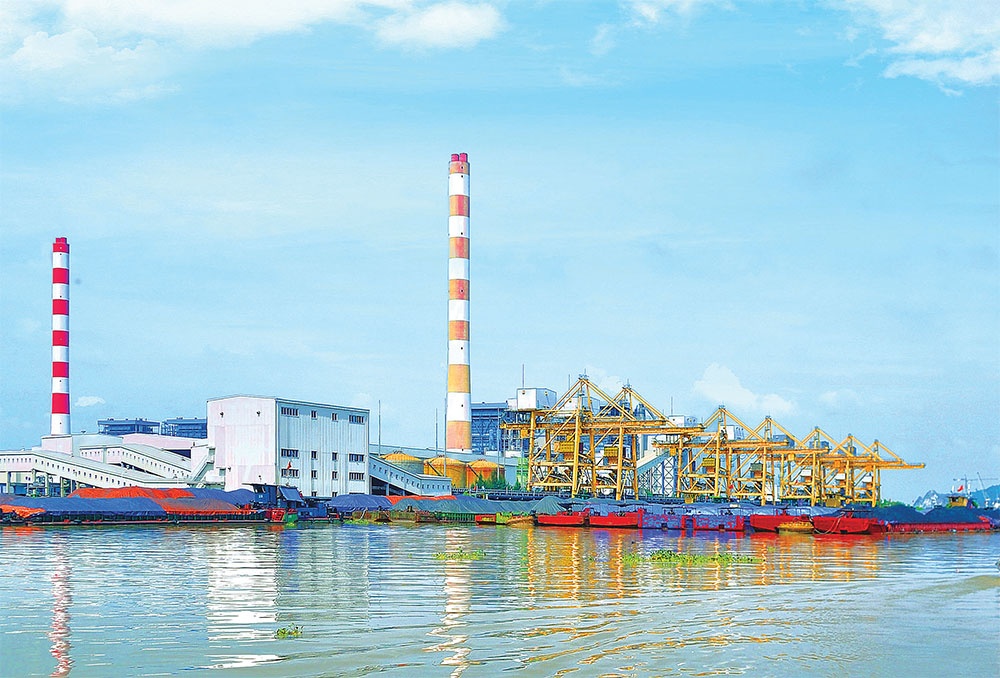 |
Seeking capital
The RMP provides further details on $15.8 billion of finance that has been committed to the JETP, $8.08 billion being provided by the IPG and $7.75 billion by the Glasgow Financial Alliance for Net-Zero. The IPG public funds will be channelled via various financial instruments and mechanisms, such as grants, concessional loans, and risk-sharing instruments over a period of 3-5 years. These funds will help to mobilise the much larger volume of private finance for the just energy transition.
With the release of this plan, Vietnam makes an additional step to work towards achieving the JETP targets. These targets include bringing forward the projected peaking date for all GHG emissions in the country from 2035 to 2030; reaching peak annual power sector emissions of 170 megatonnes CO2e by 2030; limiting Vietnam’s peak coal-fired generation capacity to 30.2GW; and accelerating the adoption of renewables so that renewable energy accounts for at least 47 per cent of electricity generation by 2030.
According to the IPG, the Vietnamese government and the IPG will continue to work together to implement the RMP. The JETP Secretariat and four working groups have been set up to progress on the implementation. As part of these groups, the IPG will support technical analytic work to guide future investment and policy actions in view of achieving JETP ambitions. These combined efforts are designed to help catalyse additional investments in Vietnam’s energy transition to enable the achievement of Vietnam JETP targets.
“We are glad to endorse Vietnam’s RMP so that Vietnam can peak earlier and, thus, shaving off significant volumes of CO2. The plan will also boost Vietnam’s renewable energy production,” President of the European Commission, Ursula von der Leyen, told PM Chinh.
“Energy must be affordable and accessible for all. Therefore, from a planned 36 per cent in renewables in Vietnam’s electricity production, it is now going up to a mix to share of 47 per cent in its mix. The plan is tailored specifically to the needs of the local economy and society. It will help develop wind and solar power, grids, and electric vehicles, for example,” she added.
Welcoming Vietnam’s RMP, UK Prime Minister Rishi Sunak also commented, “The RMP will unlock the vital finance needed to accelerate Vietnam’s transition from fossil fuels to clean energy. It will help meet Vietnam’s ambitious climate and economic goals while ensuring working people and communities are not left behind – delivering a just and fair transition to net-zero. The UK is proud to be a partner in helping to deliver it.”
On December 1, Standard Chartered Bank (Vietnam) and Vietnam’s government exchanged five MoUs, valued at approximately $3 billion in sustainable financing to support five local businesses in achieving their sustainability goals.
These include an MoU with SOVICO Group on wind power and green projects; an MoU with The Green Solutions Corporation on green hydrogen production plant in the Mekong Delta province of Tra Vinh; an MoU with GuarantCo on financing climate change and the energy transition; a master agreement with Bank for Investment and Development of Vietnam on sustainable finance transactions; and an MoU with The PAN Group on sustainable projects.
“We aim to contribute credible and meaningful dialogue that helps turn commitments into action on climate. Now is the time for outcomes to be delivered where they matter. Finance can enable and accelerate the just transition to a net-zero, towards a nature-positive economy,” said Michele Wee, CEO of Standard Chartered Bank (Vietnam).
Meanwhile, German Chancellor Olaf Scholz added, “Germany highly appreciates Vietnam’s ambitious climate targets and the commitment to increase renewable energies by 2030. We will work together to create a favourable framework and to implement the plan swiftly. Germany is committed to provide substantial financing for implementing the JETP with Vietnam.”
Dynamic sectors
Over the past few years, Vietnam has experienced a remarkable 31.6 per cent increase in energy consumption, soaring from 967.9 billion kWh in 2017 to 1,274.8 billion kWh in 2022. This surge underscores the urgency of addressing the nation’s growing energy needs while ensuring sustainability.
Marko Walde, chief representative of AHK in Vietnam, Myanmar, Cambodia and Laos, told VIR that Vietnam is facing an urgent need to transition towards renewable energy sources and enhance energy efficiency as it pursues sustainable development.
“Vietnam’s dynamic renewable energy and energy efficiency sectors present a wealth of investment opportunities for German enterprises. The country’s vast potential in solar, wind, and hydropower resources offers an ideal environment for pioneering sustainable projects,” Walde said. “German companies, renowned for their expertise in green technologies, can play a pivotal role in shaping Vietnam’s green energy landscape.”
Vietnam’s government has implemented a suite of measures designed to attract foreign investments. These include tax incentives, preferential tariffs, and streamlined bureaucratic processes. Moreover, transparent regulatory frameworks protect investors’ interests and provide a stable foundation for long-term collaboration, Walde added.
Elsewhere, on December 2, PM Chinh and World Bank president Ajay Banga agreed to accelerate the implementation of existing projects and promote game-changing projects within the framework of the latter’s $5-7 billion loans for Vietnam in the next three years.
Potential new-generation projects include those in the Renewable Energy Accelerating Change Project, one million hectares of high-yield, low-carbon rice, Hanoi-Hoa Lac high-speed railway, climate change-resilient infrastructure development in the Mekong Delta, digital transformation, and green transformation.
| Pham Minh Chinh - Prime Minister
After COP26 in 2021, the world situation has seen multiple changes, with issues outnumbering opportunities and advantages. However, with its responsibility to the whole world, Vietnam has implemented 12 major and comprehensive solutions covered in three groups aimed to reduce GHG emissions, at the same time to ensure its own energy security and achieve economic development goals. The first group is on formulating plans and implementation, including a strategy on climate change response; a green growth strategy; the Power Development Plan VIII with a bigger role to be played by renewable energy; development of the renewable energy industry; and developing a renewable energy ecosystem such as human resources and relevant facilities. The second group includes the construction and implementation of national determined contribution; the establishment of a secretariat and announcing the plans for implementation and mobilisation for the JETP; and promulgation and deployment of a plan to develop one million hectares of high-quality of rice with low emissions of GHG, especially methane. The third group of solutions is focusing on institutional construction, including the development of the Law on Oil and Gas, and improving laws on land and electricity in a direction to support the development of renewable energy. Vietnam is also now formulating and completing a decree on direct power purchase, tackling renewable power projects and outstanding issues for individuals and businesses in the process of energy transition. Time is limited, with an increase in difficulties which have become harder to predict. Thus, we should boost our solidarity and make greater efforts and actions with bigger effectiveness, all for the sake of the joint development and prosperity of humankind. (Excerpt from speech at COP28) |
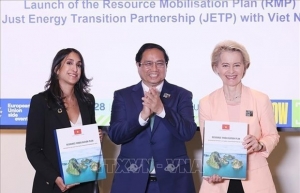 | Vietnam launches Resource Mobilisation Plan for Just Energy Transition Partnership During the World Leaders Summit at COP28 on December 1, Vietnamese Prime Minister Pham Minh Chinh launched the Resource Mobilisation Plan (RMP), which marks a key milestone towards the implementation of the Just Energy Transition Partnership. |
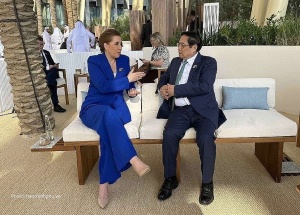 | Vietnam and Denmark key climate partners: COP28 In light of a green strategic partnership between Denmark and Vietnam established in November, the leaders of both nations have agreed to take concerted measures to further deepen the bilateral relationship. |
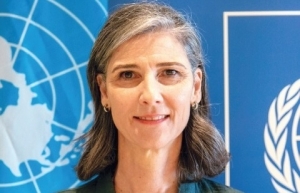 | JETP a crucial step for Vietnam’s climate ambitions Almost one year ago, the Vietnamese government agreed on a Just Energy Transition Partnership (JETP) to facilitate the transition away from fossil fuels towards cleaner forms of energy. In the months since, there has been a flurry of activity to support the operationalisation of that initial agreement. |
What the stars mean:
★ Poor ★ ★ Promising ★★★ Good ★★★★ Very good ★★★★★ Exceptional
Related Contents
Latest News
More News
- Bac Ai Pumped Storage Hydropower Plant to enter peak construction phase (January 27, 2026 | 08:00)
- ASEAN could scale up sustainable aviation fuel by 2050 (January 24, 2026 | 10:19)
- 64,000 hectares of sea allocated for offshore wind surveys (January 22, 2026 | 20:23)
- EVN secures financing for Quang Trach II LNG power plant (January 17, 2026 | 15:55)
- PC1 teams up with DENZAI on regional wind projects (January 16, 2026 | 21:18)
- Innovation and ESG practices drive green transition in the digital era (January 16, 2026 | 16:51)
- Bac Ai hydropower works stay on track despite holiday period (January 16, 2026 | 16:19)
- Fugro extends MoU with PTSC G&S to support offshore wind growth (January 14, 2026 | 15:59)
- Pacifico Energy starts commercial operations at Sunpro Wind Farm in Mekong Delta (January 12, 2026 | 14:01)
- Honda launches electric two-wheeler, expands charging infrastructure (January 12, 2026 | 14:00)

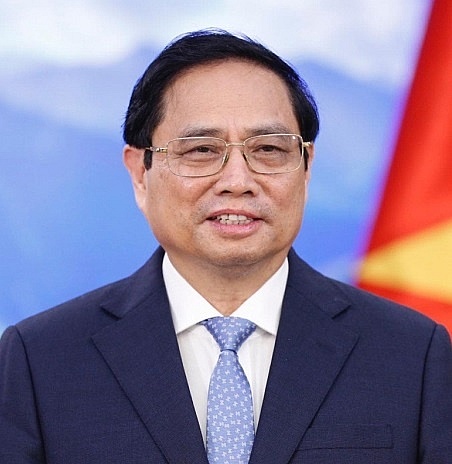
 Tag:
Tag:


















 Mobile Version
Mobile Version